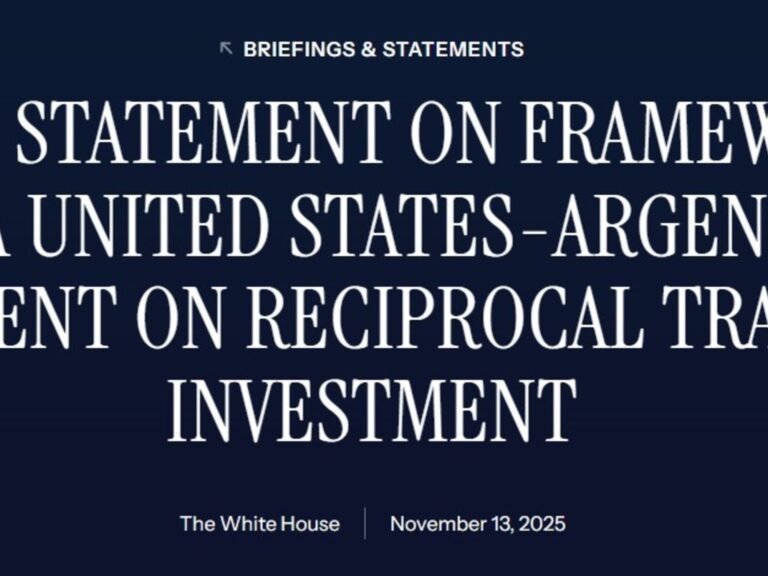
united states of america This Thursday, the President confirmed the extensive trade agreement with Argentina through a statement released after it was signed. Donald Trump and Javier Millay.
The official document emphasizes that “the relationship between the two countries is based on common democratic values and a common vision of economic freedom and open markets.” According to the text, The purpose of the agreement is to foster sustainable growth and create clear and predictable export conditions. innovation and investment.
“In pursuit of a stronger and more balanced economic partnership, the United States and Argentina have agreed to a framework to deepen bilateral cooperation in trade and investment. Framework of the Mutual Trade and Investment Agreement (Agreement).” We aim to foster long-term growth, expand opportunities and create a transparent and rules-based environment for trade and innovation.” the statement said.
The White House thus announced the trade agreement between Argentina and the United States
What is the trade agreement between the United States and Argentina?
”This result reflects each country’s ambitions and shared values and is based on Argentina’s actions. “We are already modernizing our trade and investment regime and promoting mutual conditions,” he added.
According to the White House, the key elements of the agreement are:
Tariffs: Countries open their markets to each other for major products. “Argentina will provide preferential market access for exports of U.S. products, including certain items.” Pharmaceuticals, chemicals, machinery, information technology products, medical equipment, automobiles, and a wide range of agricultural products. Recognizing Argentina’s ambitious reform agenda and its trade commitments, and in line with Argentina’s compliance with related economic and supply chain security requirements;the United States will eliminate reciprocal tariffs on certain unobtainable natural resources and unpatented items used in pharmaceutical applications. Additionally, the United States may proactively consider the national security implications of an agreement, including considering the agreement when adopting trade measures under Section 232 of the Trade Expansion Act of 1962, as amended (19 USC 1862). Similarly, the two countries have committed to improving mutual conditions for bilateral market access in beef trade,” he said.
Elimination of non-tariff barriers: ”Argentina has removed many non-tariff barriers that restricted market accessThe agreement promised to ensure a more level playing field in international trade, including import permits, and ensure that exports from the United States to Argentina would no longer require consular processing. “Argentina will also gradually eliminate statistical tax rates on US products,” the statement stressed.
Standards and conformity assessment: ”Argentina is trying to align with international standards in various areas to facilitate trade. Argentina will continue to eliminate non-tariff barriers affecting trade in priority sectors by allowing U.S. products that comply with applicable U.S. or international standards, U.S. technical regulations, or U.S. or international conformity assessment procedures to be imported into Argentina without additional conformity assessment requirements. Argentina will accept imports of vehicles manufactured in the U.S. in accordance with U.S. federal vehicle safety standards and emissions standards and will accept U.S. Food and Drug Administration (FDA) certification and prior marketing authorization for medical devices and drugs. ”
intellectual property: “Argentina has taken action against an important and notorious regional market for counterfeit goods and will continue to strengthen its crackdown on counterfeit and pirated goods, including in the online environment. Argentina is also working to address the structural challenges mentioned in the Special 301 report. It includes the Office of the United States Trade Representative’s proposed 2025 reforms, including patentability standards, patent grant delays, and geographical indications, as well as efforts to align the intellectual property system with international standards.
Access to agricultural markets: ”Argentina has opened its market to live American cattle. It committed to allowing market access for U.S. poultry within one year and agreed not to restrict market access for products using certain cheese and meat terms. toArgentina to simplify product registration process for US beefbeef products, beef offal and pork products, facility registration does not apply to imports of U.S. dairy products. “The United States and Argentina intend to work together to address non-tariff barriers affecting trade in food and agricultural products.”
work: “Argentina reaffirmed its determination to protect internationally recognized labor rights. “Argentina adopts and implements a ban on the import of forced labor or goods produced by forced labor and strengthens enforcement of labor laws.”
environment: “Argentina is committed to further combating illegal logging, fostering a more resource-efficient economy, including its important mineral sector, and fully complying with its obligations under the World Trade Organization (WTO) Agreement on Fisheries Subsidies.”
Cooperation in economic security: “Argentina will increase cooperation with the United States to counter other countries’ policies and practices that are not market-based. The two countries also committed to identifying tools to coordinate their approaches on export controls, investment security, tariff avoidance, and other important issues,” the White House added.
Business considerations and opportunities: “Argentina and the United States will work together to promote investment and trade in critical minerals. The two countries also agreed to work to stabilize global soybean trade,” he stressed.
Facing state-owned enterprises and subsidies: He added: “Argentina has committed to addressing potentially distortive behavior by state-owned enterprises and addressing industrial subsidies that may impact bilateral trade relations.”
Digital commerce: “Argentina is committed to facilitating digital commerce with the United States by recognizing the appropriate jurisdiction under Argentine law for the cross-border transfer of data, including personal data, and by refraining from discrimination against U.S. digital services and products. Argentina also intends to recognize electronic signatures that are valid under U.S. law as valid under its own laws,” the document states.
It concludes that “the United States and Argentina will work expeditiously to finalize the text of the agreement for signature and complete their respective domestic procedures before the agreement enters into force.”
“The countries will consider implementing the agreement and continue close relations.” Coordination on trade and investment issues through the Trade and Investment Framework Agreement and the Innovation and Creativity Forum for Economic Development,” he said.



